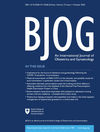|
Journal
BJOG: An International Journal of Obstetrics & GynaecologyMore Press Releases related to this journalVol 126 (13 Issues in 2021)
Edited By: Mike Marsh
Print ISSN: 1470-0328 Online ISSN: 1471-0528
Published on behalf of Royal College of Obstetricians and Gynaecologists
Impact Factor: 4.876

More Press Releases in: |
Media ToolkitContact Publicity to:
|
Posttraumatic Stress Disorder Linked To Smaller Birth Weight And Shorter Gestation
Women with posttraumatic stress disorder (PTSD) are more likely to have smaller babies and deliver prematurely, suggests new research from the University of Michigan, published today in BJOG: An International Journal of Obstetrics and Gynaecology.
The findings also found a strong link between low birth weight and shorter gestation to mothers with PTSD who suffered abuse in childhood.
PTSD is prevalent among women and can occur following traumatic events such as war, disaster, childhood maltreatment, rape and battering. Women with low sociodemographic status tend to have higher rates of PTSD in pregnancy, as do African American women.
University of Michigan researchers looked at 839 women, of which 41% were African American, from August 2005 to March 2008.
Children born to women with PTSD weighed half a pound less than traumatised women who did not develop PTSD , and nearly half a pound less than women who were not exposed to trauma. Among childhood abuse survivors, the association of current PTSD with lower birth weight was stronger.
The research also looked at race as a risk factor for PTSD. African American women are at no greater risk for onset of PTSD, but they are four times more likely to remain affected by the disorder at the time of pregnancy.
Julia Seng, Research Associate Professor, Institute for Research on Women & Gender and Associate Professor of Nursing at the University of Michigan said: “Preterm birth can cause serious health problems for babies. An African American infant in Michigan is 70 percent more likely to be born prematurely than an infant of any other race. Therefore PTSD, which is treatable and affects African Americans more widely, may be an additional explanation for adverse perinatal outcomes."
“It is essential that outcomes are improved in this high risk group of women. Maternity care needs to take traumatic stress into account with awareness being raised amongst health workers.”
Women taking part in the study were assigned to one of three follow-up cohorts after telephone interviews: women who were not exposed to trauma, women exposed to trauma but did not suffer from PTSD, and women who had PTSD. The sample was also divided into groups with and without child abuse history in order to consider its impact.
The PTSD-affected cohort had more childhood abuse, substance use and recent intimate partner violence. They also had a lower rate of adequate prenatal care than the other women.
Researchers said the reasons include having had less treatment and having had more lifetime trauma exposures which may maintain or re-activate PTSD. In addition their average age at pregnancy is younger so there would be less time between any abuse and pregnancy. The trauma-exposed resilient group had the fewest sociodemographic disadvantages and the highest rate of using adequate prenatal care.
The researchers concluded that abuse-related PTSD may explain some of the adverse perinatal outcomes generally, especially those associated with low socioeconomic status and African American race in the United States.
Researchers also said that screening for childhood abuse, PTSD and depression should occur at the start of prenatal care.
John Thorp, BJOG Deputy-Editor-in-Chief added: “Women with posttraumatic stress disorder need specialised care and screening is essential to ensure the best outcome for mother and baby.”
“Raising awareness will help health workers identify those women at risk and provide the relevant support during the antenatal period.”


